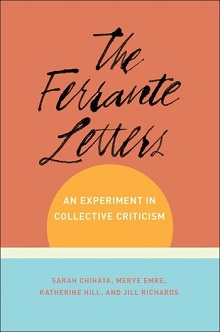Ferrante Fever | Literature, Feb. 2020
A truly innovative approach to understanding the author-reader connection; for the lit-crit crowd looking to affirm Ferrante’s reinvention of the future of the novel; these fragments of Ferrante ultimately cohere into a full, absorbing portrait of an enduring author
 Chihaya, Sarah & others. The Ferrante Letters: An Experiment in Collective Criticism. Columbia Univ. (Literature Now). Jan. 2020. 280p. ISBN 9780231194570. pap. $25. LIT
Chihaya, Sarah & others. The Ferrante Letters: An Experiment in Collective Criticism. Columbia Univ. (Literature Now). Jan. 2020. 280p. ISBN 9780231194570. pap. $25. LIT
In book three of pseudonymous Italian author Elena Ferrante’s distinguished "Neapolitan Quartet," Those Who Leave and Those Who Stay, aspiring young writer Elena mourns her separation from best friend Lila, having imagined them "writing together, being authors together, drawing power from each other because what was ours was inimitably ours." Reading and writing collectively similarly attracted novelist Katherine Hill (The Violet Hour) and academics Chihaya (English, Princeton Univ.), Merve Emre (English, Univ. of Oxford), and Jill Richards (English, women, gender, sexuality studies, Yale Univ.), who, from June to September 2015, together set out to read a book a month from the Quartet, each writing one or two letters per novel. The project transformed how the authors saw themselves as readers and writers, and quickly evolved from a casual experiment into a critical methodology they would later apply to their course syllabi. Months of conversation on and off the page gave shape to the long essays that round out this freshly conceived collection and carefully analyze Ferrante’s texts while also exploring the intricacies of female friendship.
VERDICT A truly innovative approach to understanding the author-reader connection made all the more compelling for having one of the 20th century’s greatest literary works at its core.—Annalisa Pešek, Library Journal
![]() de Rogatis, Tiziana. Elena Ferrante’s Key Words. Europa. 2019. 310p. tr. from Italian by Will Schutt. ISBN 9781609455637. pap. $18. LIT
de Rogatis, Tiziana. Elena Ferrante’s Key Words. Europa. 2019. 310p. tr. from Italian by Will Schutt. ISBN 9781609455637. pap. $18. LIT
Since the release of 2012’s My Brilliant Friend, the first in Elena Ferrante’s sensational "Neapolitan Quartet," millions of readers worldwide have gravitated to her stories, whose universal themes of "survival, alienation and inclusion, female difference and national identity" continue to resonate today. Drawing on Ferrante’s earlier novels, Troubling Love (1992), The Days of Abandonment (2002), and The Lost Daughter (2006) in context of the Quartet and the friendship between young Elena and Lila, who come of age in working-class, postwar Naples, de Rogatis (comparative literature, Univ. of Foreigners of Siena) presents close readings of these stories that "speak to the margins" to uncover "a new form of female identity," revealing through the plights of Ferrante’s characters, and their creative partnerships, how their differing points of view somehow "never become locked within a formula that makes one the opposite of the other." VERDICT An exceptional companion to the source material, particularly for the lit-crit crowd looking to affirm Ferrante’s reinvention of the future of the novel. [Note: Beginning in Feb. 2020, HBO continues its popular miniseries adapting the "Neapolitan Novels," now in its second season.—Ed.]—Annalisa Pešek, Library Journal
![]() Ferrante, Elena. Incidental Inventions. Europa. 2019. 114p. illus. by Andrea Ucini. tr. from Italian by Ann Goldstein. ISBN 9781609455583. $20. LIT
Ferrante, Elena. Incidental Inventions. Europa. 2019. 114p. illus. by Andrea Ucini. tr. from Italian by Ann Goldstein. ISBN 9781609455583. $20. LIT
In 2017, the Guardian commissioned a weekly column from Ferrante, who agreed to the project on the condition that its subjects were provided by the publication’s editors. The resulting "incidental inventions," expertly translated by longtime Ferrante collaborator Goldstein, ran from January 2018 to January 2019, offering a glimpse into the famously elusive author’s creative intentions ("I’m interested in digging into the ordinary and causing confusion, pushing myself to go beyond appearances"), most intimate memories ("What I distinctly remember about my first love is my state of confusion"), and deepest convictions ("inequality generates an extraordinary waste of minds and creative energies, which, if trained and put to use, would likely make our history an active laboratory for repairing the damage we’ve caused so far"). Accompanying Hopper-esque illustrations from Ucini match the mood of each piece perfectly.
VERDICT In prose that provokes and transforms, evoking wonder and tension in the most gratifying sense, these fragments of Ferrante ultimately cohere into a full, absorbing portrait of an enduring author.—Annalisa Pešek, Library Journal

ALREADY A SUBSCRIBER? LOG IN
We are currently offering this content for free. Sign up now to activate your personal profile, where you can save articles for future viewing









Add Comment :-
Comment Policy:
Comment should not be empty !!!